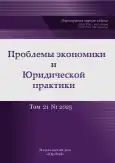The Creditor Community in Insolvency (Bankruptcy) Legal Relations: The Experience of Russia and Foreign Countries
- Authors: Sogoyan D.P.1
-
Affiliations:
- Kutafin Moscow State Law University
- Issue: Vol 21, No 1 (2025)
- Pages: 110-121
- Section: Private Law (Civil) Sciences
- URL: https://bakhtiniada.ru/2541-8025/article/view/289149
- DOI: https://doi.org/10.33693/2541-8025-2025-21-1-110-121
- EDN: https://elibrary.ru/FNPHAI
- ID: 289149
Cite item
Abstract
The current Russian legislation is characterized by the lack of a systematic approach to regulating relations between creditors in connection with their participation in a bankruptcy case. The main reason for this is that the creditor community is not granted the status of an independent entity within the framework of bankruptcy procedures. Determining the legal nature of this community, including the issue of its legal capacity, is a key condition for the formation of an effective system of legal regulation of insolvency (bankruptcy) relations. The purpose of the study is to determine the legal nature of the creditor community within the framework of bankruptcy procedures, analyze its characteristics and legal status, as well as substantiate the need to recognize its partial legal capacity for the formation of an effective system for regulating the interaction of creditors. The study is aimed at identifying systemic gaps in Russian legislation through a comparative analysis of domestic and foreign experience. Based on the results of the study, the author concludes that the creditor community has partial legal capacity, exercising its rights exclusively within the framework of insolvency (bankruptcy) legal relations. The subjectification of the creditor community as a bearer of common interests for all creditors entails the endowment of creditors, as participants in such a community, with a set of mutual obligations.
Full Text
##article.viewOnOriginalSite##About the authors
Diana P. Sogoyan
Kutafin Moscow State Law University
Author for correspondence.
Email: sogoyan99@yandex.ru
SPIN-code: 5761-9926
Postgraduate Student of the Department of Entrepreneurial and Corporate Law
Russian Federation, MoscowReferences
- Andreev V.K. The legal nature of the decision of the meeting of the economic society // Business law. 2022. No. 3. pp. 27–33.
- Ayusheeva I.Z. Civil law communities in the context of a shared consumption economy // Actual problems of Russian law. 2020. No. 6. pp. 95–104.
- Budylin S. The case of the dominant creditor: when the creditor is responsible for the results of the bankrupt's commercial activities // Legal work in a credit institution. 2022. No. 4. pp. 41–55.
- Goreva A.A. A common goal and making contributions as signs of a simple partnership agreement: dis. ... cand. jurid. nauk. Moscow, 2024. 187 p.
- Goreva A.A., Geslovskaya D.A. Reform of legislation on civil partnerships in Germany: translation of section 16 «Partnership» of the German Civil Code // Bulletin of Economic Justice of the Russian Federation. 2022. No. 6. pp. 122-153.
- Gruzdev V.V. Civil law communities: the concept and types // Journal of Russian Law. 2021. No. 10. pp. 61–71.
- Enicheva N.V. Realization of the legal capacity of a legal entity in insolvency proceedings: bankruptcy: dis. ... cand. jurid. nauk. Moscow, 2022. 220 p.
- Esmansky A.A. Debt restructuring: how to protect the interests of independent creditors // Law. 2023. No. 4. pp. 90–104.
- Kantor N.E. On double (multiple) indirect claims of beneficial owners in the interests of controlled corporations // Law. 2024. No. 8. pp. 133–145.
- Kantor N.E. The application of the business judgment rule in disputes on the civil liability of arbitration managers // Bulletin of Economic Justice of the Russian Federation. 2023. No. 7. pp. 165–182.
- Karelina S.A., Frolov I.V. Bankruptcy mechanisms and their role in ensuring human well-being: a monograph. Moscow: Justicinform, 2022. 312 p.
- Filippova S.Y. Plurality of persons and the civil law community: similarities and differences // Law. 2022. № 6. pp. 30–41.
- Frolov I.V. Exclusion from the general rule of active plurality of persons in the bankruptcy case of a citizen // Law and business. 2021. No. 1. pp. 24–30.
- Chikulaev R.V. Corporations and corporate financial instruments in Russian and foreign law // Bulletin of Perm University. Legal sciences. 2021. No. 2. pp. 285–220.
- Shevchenko I.M. On the issue of the regime of the property estate of spouses (some reflections on the example of bankruptcy cases) // Law. 2023. № 4. pp. 118–127.
- Shishmareva T.P. Digital technologies in insolvency (bankruptcy) proceedings // Business law. 2019. No. 3. pp. 50–55.
- Abdou Toure. Le préjudice collectif des créanciers d’une procédure collective. Droit. Université Bourgogne Franche-Comté, 2023. Français. p. 494.
- Dominique Owona-Atangana. Le sort des créanciers d’un débiteur en difficultés en droit OHADA à la lumière du droit français: l’égalité en question. Droit. Université Panthéon-Sorbonne — Paris I, 2021. Français. p. 400.
- Priya Garg, Trusha Modi, Balapragatha M. Anusandhan. The need to improve governance standards for committee of creditors and resolution professionals to safeguard the goal of corporate rescue // Insolvency and Bankruptcy Board of India. 2022. P. 385–404.
Supplementary files








